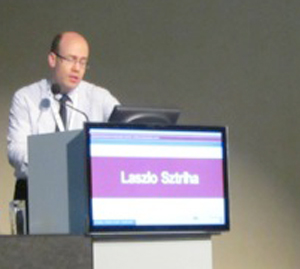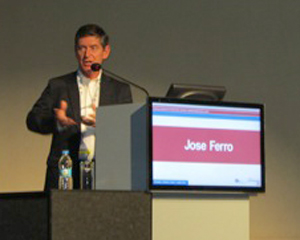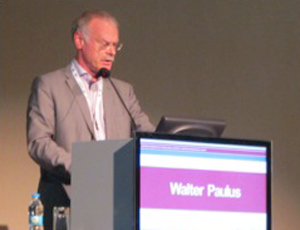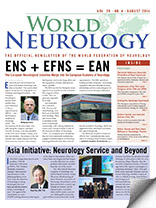EAYNT SPECIAL SESSIONS AT EFNS-ENS JOINT CONGRESS

Dr. Laszlo Sztriha discussed mobility across countries.
By Monica Moarcas, Antonella Macerollo, Johann Sellner and Walter Struhal
During neurology training, there are crossroads where the best decision is based on advice from more experienced colleagues and professors. The choice to dedicate to research or pursue the clinical path is among the first steps, and visiting departments of other sites may aid in building a career plan.
The European Association of Young Neurologists and Trainees (EAYNT) is a non-profit independent organization aimed at linking young neurologists across Europe in respect to educational and exchange of experience opportunities. In the last 14 years, it has brought together young neurologists at its Special Sessions organized at EFNS meetings where experienced speakers have discussed aspects of training and planning professional development.
During the EAYNT Special Session at EFNS-ENS Joint Congress Istanbul 2014, Prof. Jose Ferro, Prof. Walter Paulus and Dr. Laszlo Sztriha offered lectures on the “Do’s and Don’t’s in Neurology Training” covering the complementary perspectives of research and clinical work of young neurologists.
Sztriha from King’s College Hospital, London, talked about mobility across Europe during training in neurology as seen by a young neurologist. He showed that the goals of visiting a hospital in a different country include improving clinical expertise, research opportunities and possibilities to apply the new knowledge in home department. He also recommended identifying the most suitable place to visit — based on language compatibility — by looking for opportunities published on department homepages or journals or by meeting staff members at conferences or through special mobility programs that offer the opportunity to visit departments. He also discussed funding for EFNS and ENS programs, fellowship from home departments or from host institution. Sztriha also offered valuable practical advice regarding opportunities for experience exchanges for young neurologists.

Prof. Jose Ferro identified research challenges.
Prof. Jose Ferro from Santa Maria Hospital, Lisbon, Portugal, talked about the do’s and don’t’s of research. Ferro presented the steps a young researcher needs to take to build a successful career based on skills and knowledge and focused on the mission, which is determined by goals and values. He emphasized personal and interpersonal competencies of a researcher, as well as the importance of self-analysis. He also discussed the essential role of a mentor. He shared aspects from his own professional path as a researcher and presented the importance of working in foreign departments. The importance of being constant in the research topic and issues regarding authorship of papers were two important points of this talk. Ferro concluded by highlighting that determination and hard work are key characteristics of researchers who should never forget their missions.
Prof. Walter Paulus from University Medical Center Goettingen, Germany, focused on do’s and don’t’s of clinicians. Paulus presented data regarding how satisfied trainees are with their training process through a German survey. Next, he showed the current work situation of a clinician, which is between growing clinical demands, the competition for research, more administrative issues to handle that are partially compensated by stability of job and a less stressful environment after work. The lecture continued with focus on attributes a successful clinician should have, including empathy, perseverance, ambition, structured thinking, curiosity and good clinical skills. On the contrary, he discussed characteristics that a clinician should not have: a lack of interest, insufficient skills, inappropriate attitude toward colleagues and forcing the symptoms into a diagnosis.

Prof. Walter Paulus discussed clinician training.
Paulus highlighted the importance of minimizing the clinician’s own mental distress in order to ensure patient safety, and a good working atmosphere is a collective effort along with the information exchange and acquisition.
He also talked about problems he observes in residents, including poor clinical judgment, patient management, absenteeism, inappropriate interaction and management through better supervision. He highlighted the importance of mentoring residents throughout their training.
Neurology training represents a sequential process that needs personal effort to improve knowledge and skills, determination, understanding of the aims and goals and of methods to achieve them. In addition, there needs to be the touch of personality of a true mentor who not only teaches and supervises, but also serves as a model.
The three lectures gave young neurologists the opportunity to have a better understanding of aspects of training both in clinical field and research, in home departments and abroad.
Moarcas is with the Department of Neurology, Emergency University County Hospital Brasov, Romania.
